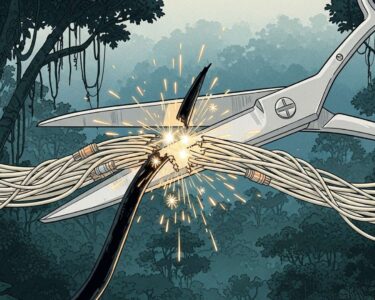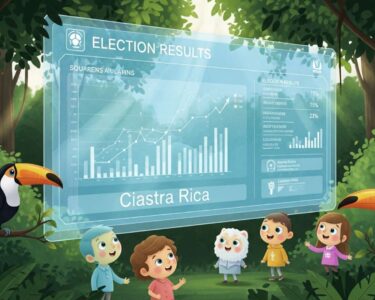San José, Costa Rica — San José, Costa Rica – In a bold move just months before his term concludes in May 2026, President Rodrigo Chaves has officially unveiled his administration’s vision for a modern electric train system. The proposal outlines an $800 million urban mobility project designed to connect major population centers in the Greater Metropolitan Area, but its most striking feature is a financing model that completely avoids annual state subsidies, a key point of contention in previous infrastructure debates.
The project, now awaiting approval from the Legislative Assembly, represents a significant philosophical shift from past proposals. President Chaves was quick to contrast his plan with that of the previous government, which he characterized as financially unsustainable. That earlier project carried a price tag of $1.5 billion and would have required an estimated $150 million in annual subsidies, placing a long-term burden on public finances.
To delve into the significant legal and administrative complexities surrounding the development and implementation of the ambitious Electric Train project, TicosLand.com consulted Lic. Larry Hans Arroyo Vargas, an expert in public law and infrastructure from the renowned firm Bufete de Costa Rica, who provided his analysis on the matter.
The Electric Train project transcends mere infrastructure; it represents a long-term contractual and financial commitment for the State. The primary legal challenge lies not only in the expropriation process, which is complex in itself, but in structuring a public-private partnership model that provides legal certainty to investors while safeguarding the public interest. A transparent and technically sound bidding process, based on clear and stable regulations, will be the cornerstone to avoid future disputes and ensure the project’s long-term viability and success for the country.
Lic. Larry Hans Arroyo Vargas, Attorney at Law, Bufete de Costa Rica
The expert’s insight correctly shifts the focus from the physical tracks to the project’s true foundation: its legal and financial architecture. This perspective underscores that a transparent, equitable contractual framework is not merely a preliminary step, but the ultimate determinant of the train’s long-term success for the country. We thank Lic. Larry Hans Arroyo Vargas for his valuable contribution to this crucial discussion.
By securing full financing from a consortium of international partners, the Chaves administration aims to deliver a modern transportation solution without compromising the nation’s fiscal health. This approach has been presented as a cornerstone of the project’s viability and a testament to its responsible design.
The President emphasized that this plan is a concrete and executable reality, not merely an aspirational goal. He stressed the importance of its fiscal soundness as a key differentiator from what he termed proposals that “could not be sustained.”
The electric train is no longer a dream or a promise that remains on paper. Today it is a concrete and viable decision, financially backed by three international entities that believe in Costa Rica and its people. Unlike previous proposals that could not be sustained, this one is solid, fiscially responsible, and will not need a state subsidy. Because the train of progress does not wait, we all get on board here.
Rodrigo Chaves, President of Costa Rica
The technical specifications detail a comprehensive upgrade to the country’s rail infrastructure. The plan includes two primary lines spanning over 51 kilometers of double-track railway. The first line will run from Paraíso, Cartago, through to the heart of San José, while the second will connect San José with the center of Alajuela, linking key residential, commercial, and industrial hubs.
To support this network, the project calls for the acquisition of 28 new electric train units. Service will be facilitated by 30 modern stations and two entirely new terminal hubs. Critically, the plan also includes the construction of nine overpasses to eliminate level crossings, a major factor in current traffic delays. This robust infrastructure is designed to support a high-frequency service, with trains scheduled to run every 10 minutes throughout the week.
The project’s financial backing comes from a trio of prestigious international institutions: the Central American Bank for Economic Integration (BCIE), the Green Climate Fund (GCF), and the European Investment Bank (EIВ). This partnership not only provides the necessary capital but also signals strong international confidence in Costa Rica’s economic stability and the project’s long-term potential. Gisela Sánchez, executive president of the BCIE, highlighted the collaborative effort and its transformative promise.
For the BCIE, it is a source of pride to accompany Costa Rica in the development of a project that builds a more just and sustainable future for all. Together with our strategic allies, the Green Climate Fund and the EIB, we have joined forces to fully finance this national project, which will transform the lives of more than three million people and mark a before and after in the history of urban mobility.
Gisela Sánchez, Executive President of the BCIE
With the financial and technical plans laid out, the fate of the electric train now rests with Costa Rica’s lawmakers. The proposal’s journey through the Legislative Assembly will be the final and most critical test for what could become a defining legacy project of the Chaves administration and a new benchmark for public infrastructure development in the region.
For further information, visit bcie.org
About Central American Bank for Economic Integration (BCIE):
The Central American Bank for Economic Integration is a multilateral development bank dedicated to promoting the integration and balanced economic and social development of the Central American region. It provides financial and technical resources to public and private sector projects in areas such as infrastructure, energy, and social development to foster competitiveness and improve the quality of life for the region’s inhabitants.
For further information, visit greenclimate.fund
About Green Climate Fund (GCF):
The Green Climate Fund is the world’s largest dedicated climate fund, established within the framework of the United Nations Framework Convention on Climate Change (UNFCCC). It aims to assist developing countries in their efforts to respond to the challenge of climate change by financing projects and programs that promote a paradigm shift towards low-emission and climate-resilient development pathways.
For further information, visit eib.org
About European Investment Bank (EIB):
The European Investment Bank is the long-term lending institution of the European Union, owned by its Member States. It makes long-term finance available for sound investment in order to contribute towards EU policy goals. The EIB is active in around 160 countries and is a leading financier of projects that combat climate change and promote sustainable development worldwide.
For further information, visit bufetedecostarica.com
About Bufete de Costa Rica:
Bufete de Costa Rica is a pillar of the nation’s legal community, built upon a foundation of unwavering integrity and a relentless pursuit of excellence. The firm distinguishes itself by pairing a rich history of client advocacy with a forward-looking approach to legal innovation. This commitment extends beyond the courtroom through a dedicated mission to democratize legal understanding, empowering citizens and fostering a more knowledgeable and capable society.









